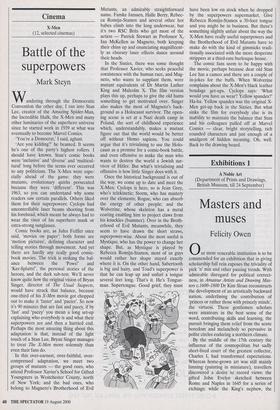Cinema
X-Men (12, selected cinemas)
Battle of the superpowers
Mark Steyn
Wandering through the Democratic Convention the other day, I ran into Stan Lee, creator of the Amazing Spider-Man, the Incredible Hulk, the X-Men and many other luminaries of the superhero universe since he started work in 1939 at what was eventually to become Marvel Comics.
`You're a Democrat,' I said, aghast.
`Are you kidding?' he beamed. It seems he's one of the party's highest rollers. I should have known. Stan's comic books were 'inclusive' and 'diverse' and 'multicul- tural' long before the terms ever occurred to any politicians. The X-Men were espe- cially ahead of the game: they were mutants, evolutionary quirks persecuted because they were 'different'. This was 1963, so you can understand why some readers saw certain parallels. Others liked them for their superpowers: Cyclops had uncontrollable laser beams shooting from his forehead, which meant he always had to wear the visor of his superhero mask or extra-strong sunglasses.
Comic books are, as Jules Feiffer once said, 'movies on paper': both forms are `motion pictures', defining character and telling stories through movement. And yet there are hardly any really good comic- book movies. The trick is striking the bal- ance between the Tows!' and `Ker-Splatte, the personal stories of the heroes, and the dark sub-text. We'll never know quite how the original vision of Bryan Singer, director of The Usual Suspects, would have struck that balance, because one-third of his X-Men movie got chopped out to make it 'faster' and `pacier'. So now it's 90 minutes that are fast and pacey, if by `fast' and `pacey' you mean a long set-up explaining who everybody is and what their superpowers are and then a hurried end. Perhaps the most amazing thing about this adaptation is that, instead of the light touch of a Stan Lee, Bryan Singer manages to treat The X-Men more solemnly than even their fans do.
In this over-earnest, over-faithful, over- compressed adaptation, we meet two groups of mutants — the good ones, who attend Professor Xavier's School for Gifted Youngsters in Westchester County, north of New York; and the bad ones, who belong to Magneto's Brotherhood of Evil Mutants, an admirably straightforward name. Famke Janssen, Halle Berry, Rebec- ca Romijn-Stamos and several other hot babes climb into the long underwear, but it's two RSC Brits who get most of the action — Patrick Stewart as Professor X, Ian McKellen as Magneto, both keeping their chins up and enunciating magnificent- ly as cheesey laser effects dance around their heads.
In the Sixties, there was some thought that Professor Xavier, who seeks peaceful coexistence with the human race, and Mag- neto, who wants to supplant them, were mutant equivalents of Dr Martin Luther King and Malcolm X. The film version plays this up, perhaps to give the old hams something to get motivated over. Singer also makes the most of Magneto's back- ground as a Holocaust survivor. The open- ing scene is set at a Nazi death camp in Poland, the sort of childhood experience which, understandably, makes a mutant figure out that the world would be better off without Homo sapiens. You could argue that it's trivialising to use the Holo- caust as a premise for a comic-book battle, and even offensive to make the man who wants to destroy the world a Jewish sur- vivor of Hitler. But what's trivialising and offensive is how little Singer does with it.
Once the historical background is out of the way, we come up to date and meet the X-Men: Cyclops is here, so is Jean Grey, who's telekinetic; Storm, who has mastery over the elements; Rogue, who can absorb the energy of other people; and the Wolverine, whose skeleton has a metal coating enabling him to project claws from his knuckles (bummer). Over in the Broth- erhood of Evil Mutants, meanwhile, they seem to have drawn the short straws, superpower-wise. About the most useful is Mystique, who has the power to change her shape. But, as Mystique is played by Rebecca Romijn-Stamos, most of us guys would rather her shape stayed exactly where it is. On the other hand, Sabertooth is big and hairy, and Toad's superpower is that he can leap up and unfurl a tongue several feet long. That's it. He's Tongue- man. Supertongue. Good grief, they must have been low on stock when he dropped by the superpowers supermarket. Give Rebecca Romijn-Stamos a 30-foot tongue and you might be in business. But there's something slightly unfair about the way the X-Men have really useful superpowers and the Brotherhood of Evil Mutants have to make do with the kind of gimmicks tradi- tionally associated with the more desperate strippers at a third-rate burlesque house.
The comic fans seem to be happy with the movie, perhaps because dear old Stan Lee has a cameo and there are a couple of in-jokes for the buffs. When Wolverine complains about the X-Men's black leather bondage get-ups, Cyclops says: 'What would you have us wear? Yellow spandex?' Ha-ha. Yellow spandex was the original X- Men get-up back in the Sixties. But what sinks the film for everybody else is its inability to maintain the balance that Stan and his colleagues pulled off at Marvel Comics — clear, bright storytelling, rich rounded characters and just enough of a smidgeon of hidden meaning. Oh, well. Back to the drawing board.


























































 Previous page
Previous page